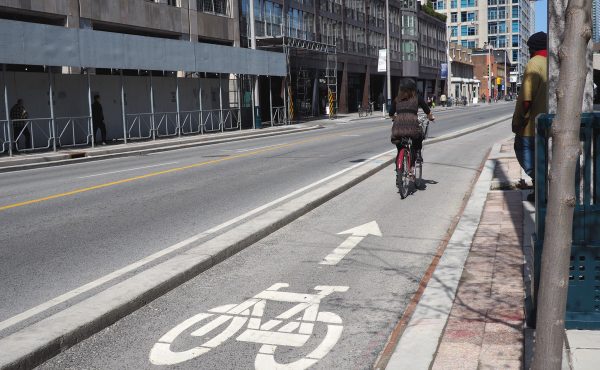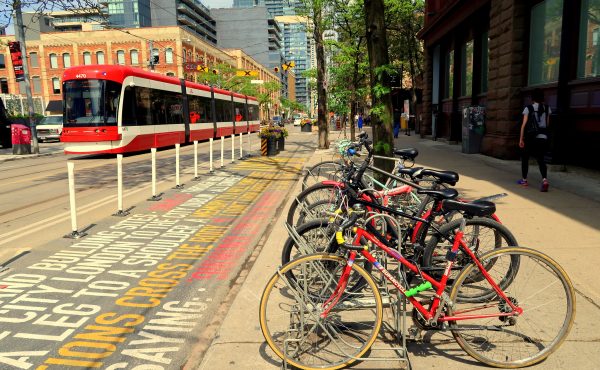
Just three days into this year’s Bike Month, a damp May 28th was host to Bike Summit 2009, a day-long conference on cycling policy co-hosted by the Toronto Coalition for Active Transportation (TCAT) and the Clean Air Partnership. International and local presenters covered everything from bike parking to economic and health improvements, sharing perspectives and recommendations that could greatly improve our city’s cycling potential. Spacing will revisit and follow up on some of these ideas, perspectives, and words of two-wheeled wisdom, in hopes of continuing this momentum and encouraging Toronto to actually reach some of the best practices presented at the summit.
![]()
In light of recent victories such as the Jarvis bike lane and last year’s 37-3 City Council vote in favour of the 5-year capital budget, the $70 million dollar question remains: how do we go about increasing and diversifying the number of people who will actually take advantage of a more bike-friendly Toronto? The summit’s panel of experts have all sorts of answers, all agreeing that broadening the discussion in order to make space for more voices and less polarization is the way to go.
Adolfo Hernandez of Chicago’s Active Transportation Alliance presented at the summit in a session titled Cycling Advocacy and Community Engagement. Hernandez brings cycling awareness straight to its target audience. Specifically focusing on Chicago’s Latino and African American communities, he directs his energy into building meaningful partnerships with community centres, places of worship, and public service and community organizations, emphasizing the importance of genuine community collaboration. According to the Complete Streets initiative, “a street is not complete until everyone is accommodated.” The ATA sends transportation experts to schools, community events, and neighbourhood festivities such as block parties, creating dialogue right where the action starts.
Hernandez’s advice is particularly pertinent, as tomorrow will inaugurate a newcomers outreach initiative pursued by the Toronto Cyclists Union in collaboration with settlement agency, CultureLink. The campaign, Cycling: From Back Home to Our New Home, will take off at a public launch, June 17th at 2pm in CultureLink’s new location at 2340 Dundas St.W, Suite 301 (Crossways Mall/Entrance by the Toronto Public Heath office). The campaign aims to promote cycling among newcomers through such activities as the creation and distribution of cycling resources translated into Toronto’s 15 most used languages.
The founder of the Toronto Cyclists Union (and long-time Spacing affiliate), Dave Meslin, also spoke at the session, and he has lots to say on the issue of accommodating diverse interests. Meslin has dedicated years to creating a space for more consolidated transit planning. He addressed the factionalism that exists in and around transportations debates, promoting a reimagination of streets based on how each user group — cyclists, pedestrians, public transit users, etc — articulates their own best interests. This means leaving behind stale and traditional ways of talking about the issues, and allowing for new terms, discourse, and solutions to emerge.
Only then can we really succeed in sharing the road, agreed fellow presenter Eleanor McMahon of Share the Road Cycling Coalition. McMahon too focuses on developing partnerships, encouraging grassroots participation, and re-shaping the discussion, if cyclists are going to have more influence in the political sphere. Share the Road and many others will continue this discussion at the Ontario Bike Summit, taking place in Waterloo, Sept 21-22.
Lessons learned: sensational and outdated terms, such as the “war on cars,” further polarize and limit the discourse, without doing anything productive for cycling advocacy. Innovative new discussion that has been opened up to a diversity of voices will bring about realistic and participatory solutions.
Photo by Commodore Gandalf Cunningham




6 comments
The point of that term is to stifle cycling advocacy. I’ve never heard any rational cycling advocate use the term. People who are opposed to expanding cycling infrastructure use that term to poison the discourse.
I wish Spacing would devote as much attention to the Toronto’s long term fiscal health as Cycling.
Glen
I would argue that cycling can/has a large impact on our local economy. Sustainable transportation and clean air make the city more livable and desirable.
That aside, please remember the mandate of the magazine: to cover issues in the public realm and spaces of the city. We’re not the Toronto Star of Financial Post, which do much reporting on the topic you desire. Spacing gives coverage to topics that the mainstream media ignores of does a shoddy job of covering. Your comments on the financial state of the city pretty much cover off the topic anyway, so you’re the one filling that void on here. 🙂
To my mind, constructive engagement centers around two basic ideas.
The first, is being embraced in the initiative mentioned in the above post, which is to say making ideas ‘accessible’ to people via differing languages or by bringing meetings or events to the affected communities. This makes a movement both Appear and in fact, Be more welcoming.
The second essential characteristic of constructive engagement is persuasion. That is to say, bringing people to see your point of view, by seeing that is can be in their best interest.
I think too, often, we in activist circles assume that by offering ‘ecological’ arguments or ‘social good’ arguments we can persuade enough others to join in our cause. Surely we should make those arguments…
But sometimes its about admitting that someone who is a car driver is likely to stay one, and finding a way to sell that driver on how the better transit service, the new bike lane or the improved streetscape will benefit them.
There could be a multitude of examples, but why can’t we make an argument like:
1) This will get the bikes out of your way.
2) This will Improve your business
3) This will get OTHER drivers off the road, and speed your trip up.
4) This will help your spouse/child get to work or school without you having to drop them off….
etc.
BIAs are showing how this is increasingly possible; where Bloor-Yorkville sacrificed parking on Bloor for wider sidewalks, and now the Entertainment District is proposing similar changes for John Street.
Clear they didn’t support these changes merely for the civic good, but because they believe it will benefit them financially.
Touche Matthew 🙂
Albeit, the relationship of one to the other is still relevant (see my recent postings on the increases in driving out of the city for work). The relationship between home and work, and therefore the feasibility of alternate transport, is greatly effected by such matters.
Ben:
Thanks for your comment. I didn’t intend whatsoever to put that inflammatory phrase into the mouths of Toronto’s cycling advocates. I simply wanted to emphasize the need to open up and de-polarize transit dialogue.
For further insight into this purported “war on cars,” whether it exists, and who’s perpetuating the use of this term, check out today’s post by Shawn Micallef:
https://spacing.ca/toronto/2009/06/17/how-to-fan-the-flames-of-the-fake-war-on-the-car-in-toronto/